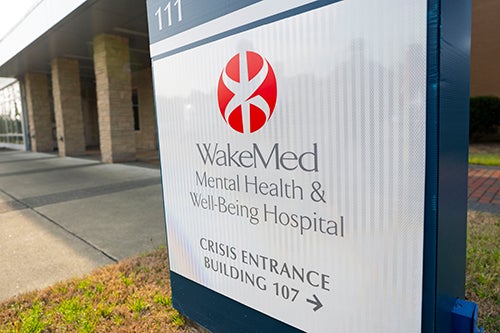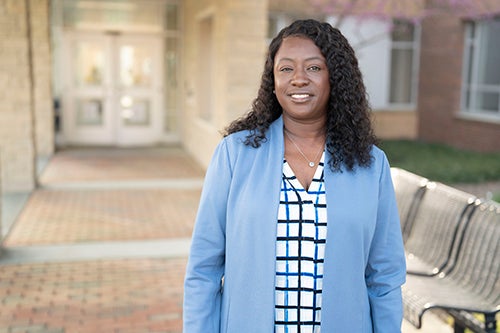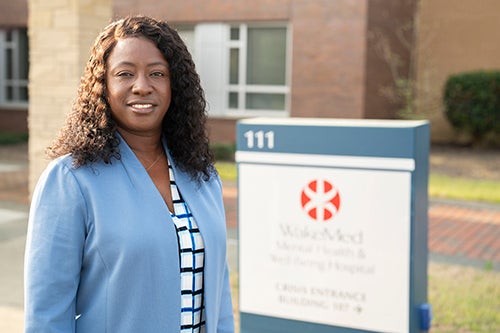WakeMed Mental Health & Well-Being - WakeBrook Discovery & Vision Manager, Julla Panneh, Speaks on Minority Mental Health Awareness
April 2, 2024Julla Panneh, MSN-NL, RN, PMH-BC, NE-BC, is the Discovery & Vision manager for WakeMed Mental Health & Well-Being Hospital – WakeBrook, slated to open May 1, 2024. Originally from West Africa, she graduated from Gambia College School of Nursing and Business in West Africa. She then pursued her bachelor's degree through Fayetteville State University in Fayetteville, NC. She went on to earn a master's in nursing leadership from Western Carolina University in Cullowhee, NC. Panneh is actively pursuing her doctor of nursing practice (DNP) at Maryville University in Maryville, TN.
Panneh's Mission at the New Mental Health & Well-Being Hospital
Panneh's mission for WakeMed Mental Health & Well-Being Hospital – WakeBrook is to help address mental health challenges that individuals face daily in the Wake County area. Her goal is that patients will find it to be a place of hope, healing and health.

Inpatient Population Who Will Receive Care
The patient population for the hospital will be adults 18 years and older. They will mostly be drawn from those admitted to WakeMed who have been medically cleared but have a psychiatric diagnosis as their primary concern.
Panneh is committed to this work since she sees firsthand the mental health crisis throughout the United States also implicated within the state and the county.
"As we embark on a journey of understanding and empathy, it's a reminder that mental health is essential for quality of life, and it deserves our attention, our care and our understanding."
Special Challenges Among Minority Communities
In light of her own minority heritage as an immigrant, an African and a woman, Panneh also sees the impact that mental health challenges have on minorities, including people of color.
"Especially within our minority communities, the stigma, cultural barriers and lack of access have obscured the path to mental wellness. We need to break down these barriers to support."
Panneh believes that recognizing and addressing mental health and the signs is very challenging. Yet, recognizing mental health issues is the first step toward healing and recovery, which she believes is half the battle for minority populations.
Barriers Minorities Face
Panneh observes that, in general, there is a stigma behind mental illness, so many will not come forward if they have mental illnesses. She also finds that the signs can be quite subtle since many minorities will go to great lengths to hide their issues, so they are not seen as weak or vulnerable in a society where they are not the majority, and therefore, not the "norm."
Other barriers include the following:
- Distrust in the health care system
- Panneh finds that due to a history of maltreatment against minorities, and, in particular, people of color, there is an engrained lack of trust in the health care community. Many may fear that the goal of health care professionals is not to help but to harm.
- Lack of diversity among health care providers
- More than half of all health care providers in the United States are Caucasian men, so this makes some minorities more hesitant to seek care or to be able to access someone who they feel looks more like themselves.
- Lack of culturally competent providers
- Many providers may not understand or be aware of the cultural differences of the underrepresented populations they treat. This could make minorities less confident and comfortable in sharing their mental health challenges.
- Lack of insurance, underinsurance
- Minorities represent a high percentage of low-income wage earners as well as those who are underemployed or unemployed. As a result, many lack insurance that covers high quality care.
- Language barriers
- Immigrants may also find it challenging to share their experiences because they may not be fluent in the language, or they may speak it with a strong dialect, resulting in a lack of mutual understanding between the provider and the patient.
Signs of Mental Health Challenges
Panneh notes that for this reason, it is critical to recognize the hidden and often silent signs of mental health challenges in oneself as well as in loved ones. Here are the most common:
- Difficulty concentrating or making decisions
- Extreme mood swings
- Increased alcohol or drug use
- Irritability or anger outburst
- Loss of interest in activities once enjoyed
- Persistent sadness, anxiety or hopelessness
- Significant changes in eating habits
- Significant sleep disturbances, including too much sleep, insomnia or trouble staying or falling asleep
- Social withdrawal
- Thoughts of self-harm or suicide
Causes of Mental Health Challenges among Minorities
Panneh believes minorities face unique challenges because they realize their differences are perceived as a deficit from a very young age or upon immediately entering the United States. Stereotypes evidenced in the media and acted out in real life reveal a lack of cultural understanding, and so they are not acknowledged as individuals, but are rather seen as a statistic. This can lead to any number of challenges that make the person feel that throughout their lives, there has been a failure to acknowledge symptoms, empathize and provide guided for support.
Still, Panneh is incredibly hopeful.
"As we in the health profession have become more aware of these challenges, we have worked collectively from the ground level to address these disparities, but we still have a lot of work to do."
When and Where to Seek Care
Panneh also believes it's important for minorities and all people to realize that they have the power to advocate for themselves. They should not wait for someone else to notice something is wrong.
"If you or someone you know is experiencing any signs of mental health challenges, including irritability, extreme sadness, changes in your eating or sleeping patterns or unexplained aches and pains, it is important to talk to someone and seek help. Remember, it is okay not to be okay. Seeking help is not weakness."
Here are several avenues to find competent help:
- Primary care providers
- Urgent care or the emergency department (if physical injury is involved)
- Spiritual and pastoral church leadership
- Mental Health Crisis & Suicide Lifeline — 988 (landline: 800-273-8255)
- Veterans Crisis Lifeline — 838255
- Daymark Recovery Services 24/7 Crisis Hotline — 866-275-9552
- Carolina Outreach — 919-251-9009
- Monarch Behavioral Health Urgent Care
- Triangle Springs Emergency Services — 919-561-5714
- Yelverton’s Enrichment Services — 919-872-6220
- 24/7 Wake County Hotline: 855-453-8985
What to Expect When Receiving Care
Crisis Care
Patients who are in active crisis should first seek care through a mental health crisis center or local emergency department (particularly if medical issues are also present) where they will be provided methods to quickly stabilize them. If a health care or mental health care provider determines after a thorough assessment that the patient would benefit from inpatient mental health care, they can refer the patient to an inpatient mental health hospital.
Inpatient Mental Health Care
Inpatient mental health care is available by provider referral only. WakeMed Mental Health & Well-Being Hospital – WakeBrook is slated to open May 1. Other inpatient facilities exist in our area and region. Inpatients can expect to stay for up to about two weeks. The desire is to prepare them to reenter their daily lives, with referral for ongoing outpatient support.
Final Words in Honor of Minority Mental Health Awareness Month

Panneh shares, "As we celebrate Minority Mental Health Awareness Month, let us pledge to be more observant, compassionate and supportive of those around us. Let's educate ourselves and others about the importance of mental health and the impact of cultural, societal and economic factors on the mental health and well-being of minority populations and everyone in the United States. Let's advocate for increased access to mental health services. In this way, the incorporation of cultural competency in health care will help dismantle the stigma surrounding mental health challenges.
"And, if you know of someone experiencing any physical or emotional symptoms that are abnormal day-to-day, please encourage them to seek support.
"Kindness and understanding make a difference, whether it's a friend, a family member, a colleague or a stranger, together we can build a community that recognizes the importance of mental health and champions the cause of those who struggle in silence. In time, we can celebrate a new trend of more and more people taking steps forward to seek support."
